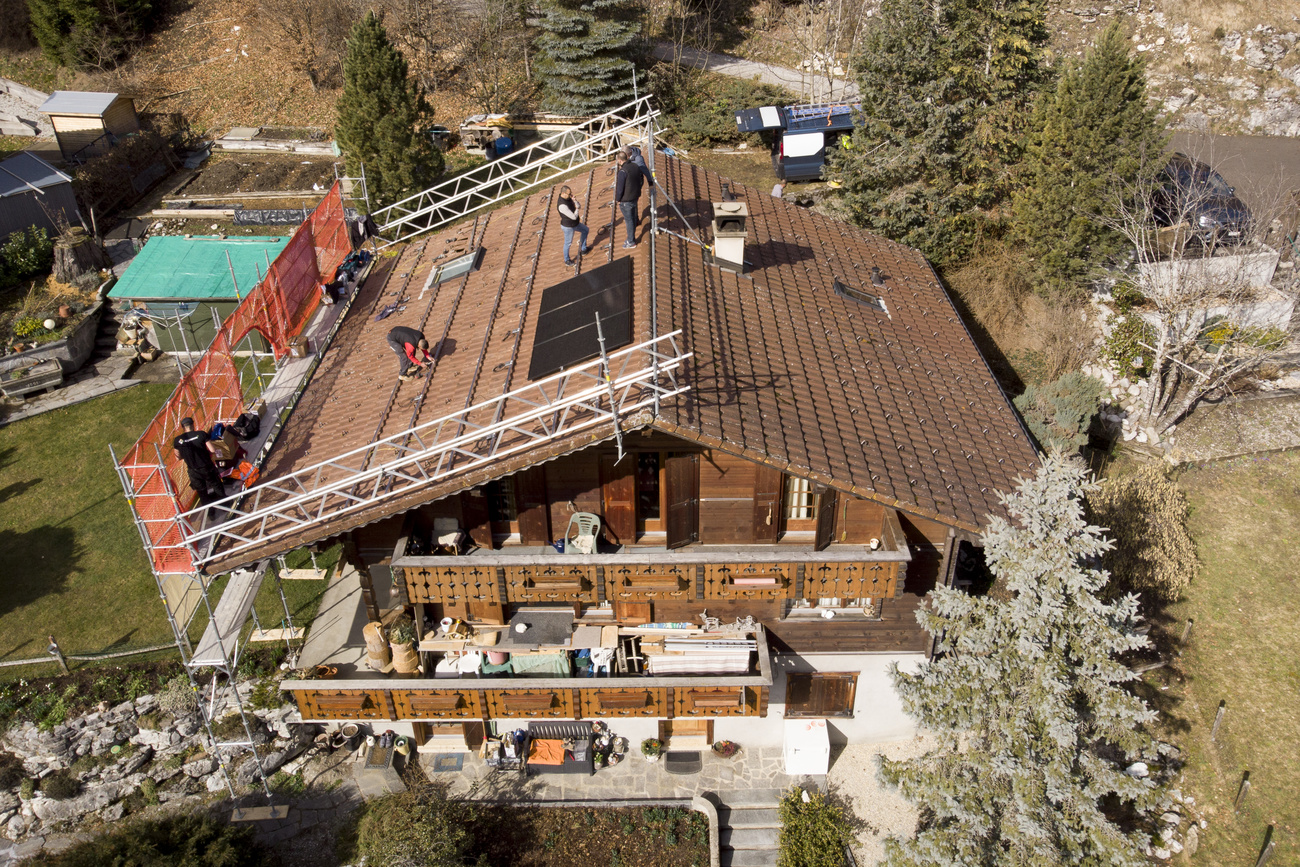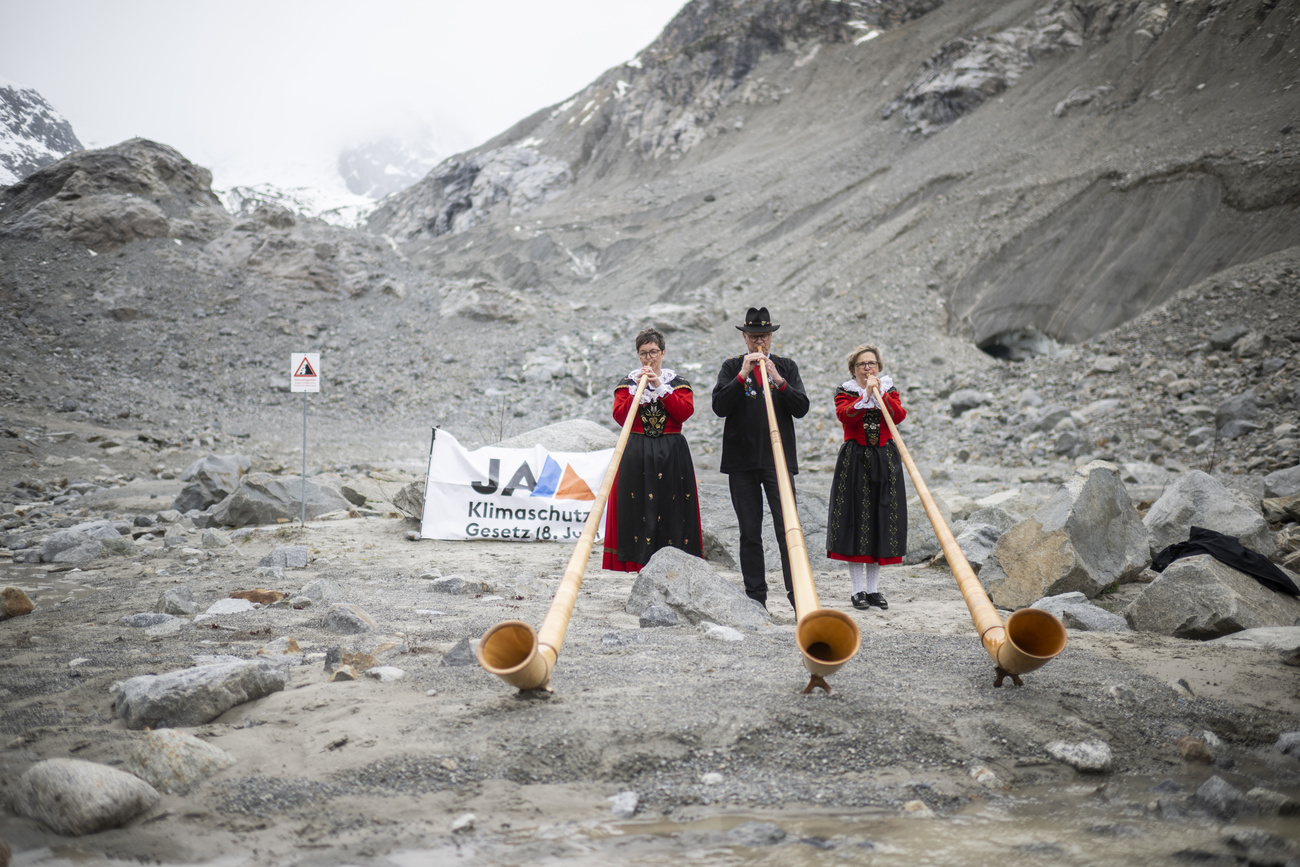
Switzerland in 2050: portrait of a climate-neutral country

On Sunday, the Swiss electorate endorsed the government’s goal of reaching climate neutrality by 2050. But while studies show that Switzerland could achieve energy security without fossil fuels, this will require big changes in behaviour, says an energy transition expert.
Switzerland has committed to becoming climate neutral by 2050 – emitting no more greenhouse gases than natural or technological reservoirs can absorb. In all, 59.1% of voters approved the government’s new climate and innovation lawExternal link on Sunday, according to the final results. But many questions remain unanswered.

More
Swiss approve net-zero climate law
What will Switzerland look like without – or with minimal – fossil fuels?
Lucerne’s 2226 buildingExternal link points to a possible future for architecture. This pilot project is heated using only the warmth generated by its occupants, equipment, and lighting. It is cooled solely by ventilation panels.

The building is currently unique in Switzerland, but its designers believe it offers many advantages: “its energy consumption is one-third of that of a traditional building equipped with heating and air conditioning systems,” says Thies Böke, the 2226 project director. “We save money while also reducing CO2 emissions.”
This type of construction needs to become more common in the next 30 years in order for the country to reach its net-zero target. But Switzerland also plans to use other technologies, including heat pumps in well-insulated buildings, electric cars, hydrogen trucks, solar panels, wind energy, and carbon-capture technology.
Is the target realistic?
The government assertsExternal link that CO2 emissions generated by transport, buildings, and industry can be reduced by 95% using existing technology and renewable energy. The government also believes that other greenhouse gas emissions could be reduced, particularly in agriculture. Any remaining emissions will have to be captured and stored – either by natural carbon sinks like forests and soil or by technologies that remove greenhouse gases from the air or directly at the place of production.
“In any case, this transition is going to happen, whether we want it or not. Oil will run out sooner or later, and Europe has no option other than to bet on renewable energy,” says Marc MullerExternal link, an engineer and independent expert specialising in energy transition.
Muller believes that despite Switzerland’s typically slow democratic process, politicians will collaborate and work quickly to find solutions – because the cost of inaction is significantly higher than the cost of action. “Switzerland has already proven several times in the past that it knows how to act rapidly when under pressure,” he says. This will be a decisive factor in the success of the transition. “The sooner we regain control of our energy production, the less we’ll be at risk of suffering the potentially devastating consequences of energy scarcity at the global level.”

Can energy security be guaranteed?
Yes, according to two studies published shortly before the vote. The first, published on May 24External link by an expert group from the Energy Science Center at the Swiss federal technology institute ETH Zurich, concluded that a secure energy supply is achievable in Switzerland both technically and financially.
The report claimed that electrifying the transportation and heating sectors will lower the country’s overall energy usage. This transition will, however, increase annual demand for electricity from 60 terawatt-hours (TWh) currently to 80-100 TWh in 2050. The ETH Zurich researchers believe this increase can be met by boosting the amount of renewable energy produced domestically and by trading clean energy with other European countries.
The second study, published on May 30External link by researchers at the Swiss Federal Institute of Technology Lausanne (EPFL) and the University of Applied Sciences and Arts, Western Switzerland (HES-SO), goes a step further. It estimates that Switzerland could achieve carbon neutrality in 2050 without having to import electricity. The key: producing a massive amount of solar energy during the summer and storing part of it – using dams as giant “batteries” – for use during the winter.
In this scenario, about 60% of the country’s roofs would need to be covered with solar panels. Wind-power generation would also have to increase during the winter. According to the researchers, this energy system would not only reduce greenhouse gas emissions but also cost less. It would no longer be necessary to pay for imported oil, gas, or electricity, which in the long term would generate savings to the order of 30%.
Will the Swiss need to change their habits to achieve climate neutrality?
Without a doubt. “It isn’t always highlighted in the reports, but we can’t achieve these goals without strict energy-saving measures,” Muller says. At the moment, for example, there is no viable alternative for decarbonising the aviation sector. “It would take 30% of the electricity produced worldwide to permit all of the planes to fly cleanly,” Muller explained. “It’s obscene, considering that only 1% of the global population uses this form of transportation regularly.”
Muller believes that Switzerland will also need to repatriate some amount of industrial production and diminish imports drastically from Asia and elsewhere. Otherwise it runs the risk of making other countries pay the cost of the transition. “But we don’t really like to admit this in a country that has built its prosperity on free trade and open markets,” Muller says.
It will also be necessary to persuade the substantial minority of citizens who voted “no” on Sunday. “Until now, we’ve made ecological action as difficult as possible,” said Muller. He calls for reducing constraints that discourage a decarbonised way of life. “For example, you have to fill out many forms in order to change your heating system, whereas you can fly 50 times a year without any obstacles. This has to change,” he says.

More
Can solar panels on highways accelerate the supply of green energy?
Are other countries also aiming for climate neutrality?
According to Net Zero TrackerExternal link, 148 of the 198 countries which are party to the UN Framework Convention on Climate Change have declared that they want to achieve climate neutrality. Together they represent 88% of global emissions and 85% of the world’s population. Most of them want to reach the goal by 2050. But some countries are more ambitious: Finland hopes to achieve net-zero emissions by 2035, and Germany by 2045. China and Russia, two of the world’s largest emitters, are aiming for 2060.
In 2019, the United Kingdom was the first major industrialised country to turn its net-zero target into law. In total, including the Swiss vote on Sunday, 26 countries have now legislated for climate neutrality, including France, Germany, Spain, Denmark, Japan, and South Korea.
“No country has figured out THE ideal solution, but the Nordic countries are a source of inspiration,” Muller says. “I admire Denmark, for example, where two-thirds of the wind farms are owned by citizens. The ecological transition therefore goes hand in hand with a democratisation of the energy infrastructure.”
Translated from French by Katherine Bidwell

In compliance with the JTI standards
More: SWI swissinfo.ch certified by the Journalism Trust Initiative
































You can find an overview of ongoing debates with our journalists here . Please join us!
If you want to start a conversation about a topic raised in this article or want to report factual errors, email us at english@swissinfo.ch.